Whether Zucchinis can cross-pollinate has become one of the most common questions. Zucchinis is a summer squash belonging to the cucurbit family. It has various varieties, but will they cross-pollinate? Let’s see.
Zucchinis can cross-pollinate with other Zucchini varieties and squashes from the same genus but not with other cucurbit species. For example, a green Zucchini can cross-pollinate with a yellow Zucchini but won’t cross-pollinate with cucumbers or cantaloupes.
There has been a lot of confusion about Zucchini’s pollination. But do not worry. This article will clear all your confusion as we have explained every detail related to the pollination of Zucchinis through this article.
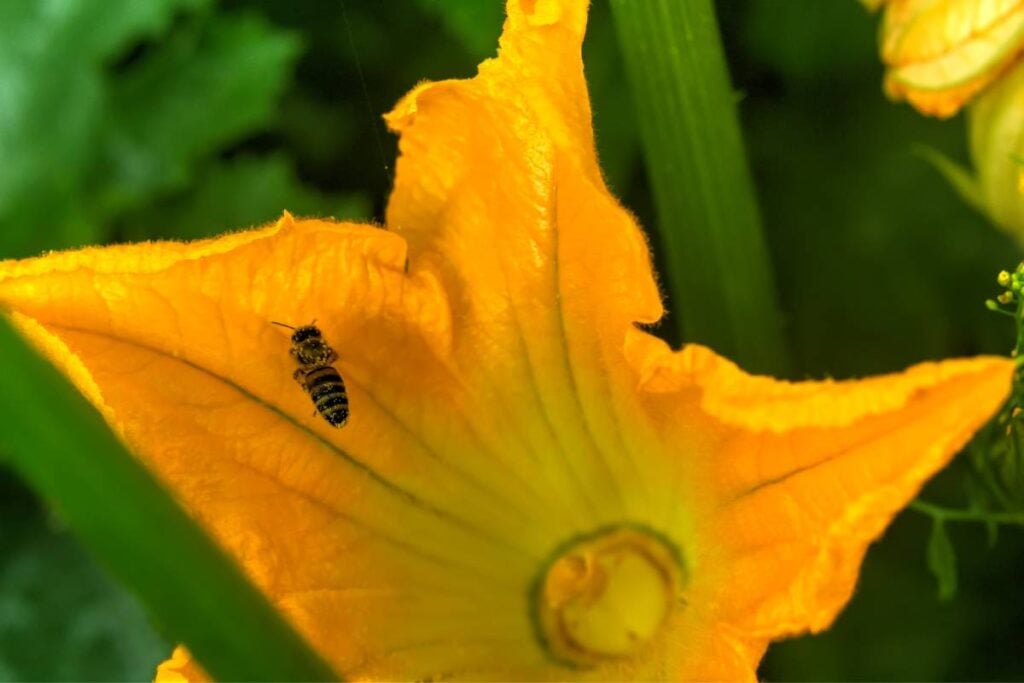
Understanding Cross-Pollination
Before we delve into the topic, let’s learn about cross-pollination.
Cross-pollination happens when two separate varieties exchange their pollen grain and pistil to grow an entirely different variety with the features of both parent plants.
The pollen of the male flower from one Zucchini variety is carried to the female flower of the plant from another Zucchini variety, and that’s how the hybrid is produced.
Since Zucchini (Cucurbita Pepo) is a summer squash, it can cross-pollinate with all Zucchini varieties, most summer squashes, and some winter squash varieties.
Zucchinis can cross-pollinate with the other cucurbit species.
For example, a Zucchini cannot cross-pollinate with Cantaloupe or Cucumber because the pollen will be incompatible.
I have 2-3 Zucchini varieties and some cucurbits too.
But, I avoid cross-pollination between any of them.
I love maintaining the genetic purity of the Zucchinis, and I grow some of them for specific reasons. I love enjoying them primarily by cooking.
There is no guarantee how a hybrid might taste or whether it will be edible. I have heard that hybrids are incredibly bitter and toxic.
So, I discourage cross-pollination.
If I cannot eat such Zucchinis, there is no point in growing them.
I have witnessed many gardeners do it because they are curious and want to experiment with what kind of hybrid comes out.
Self-Pollination vs. Cross-Pollination
Zucchinis are self-pollinating plants.
They have both male and female flowers in one plant and do not require any second plant for pollination.
Self-pollination does not mean that the pollen from the male flower will be automatically carried to the female flowers.
External agents like air, wind, birds, bees, or butterflies will carry the pollen to the female flower.
Now, let’s talk about the difference between these two types of pollination:
Self-pollination
In self-pollination, the pollen from the male flower is carried to the female flower of the same plant or a different plant of the same variety.
For example, if you have a Pattypan Zucchini, the pollen from the male flower in this plant will be carried to the female flower in this variety only.
The female flower can be from the same plant or a different Pattypan Zucchini.
Cross-pollination
As I mentioned, the male flower’s pollen will be carried to the female flower from a different species or variety in cross-pollination.
For example, the pollen from the Pattypan Zucchini will be carried to the female flower of the Zephyr Zucchini.
In Zucchinis, both are possible.
Many people do not like this as they want to maintain the purity of the genes, and hybrids are not edible.
But some still support it out of curiosity about what kind of hybrid will grow.
Factors Influencing Cross-Pollination
Cross-pollination is encouraged by some and discouraged by others.
But still, cross-pollination happens, and several factors influence it:
- The first reason is proximity. Cross-pollination is possible when you plant different Zucchini varieties in the same garden within a short distance.
- High pollinator count is another factor. The Zucchini flowers will increase the pollinators’ activity, leading to self and cross-pollination (provided you have planted different varieties together).
- Windy weather is another factor. Pollen from the male flower will fly away and can sit on the female flower of a different variety when different varieties are close to each other.
The Role of Insects
The insects play a very crucial role in the pollination of Zucchinis.
In pollination, the pollen produced by the male flower will be carried to the female flower.
External agents, like insect pollinators or wind, should carry the pollen.
Insects are the primary external agents that carry the pollen from the male to the female flower.
When insect pollinators reach the flower for nectar, the bodies will come in contact with the pollen.
When these pollinators reach the female flowers, the pollen will fall off their body into the female flowers and get transferred to their stigma, therefore facilitating pollination.
Mostly, bees are the primary pollinators.
Other insects like butterflies and flies are also included, but they contribute to pollination to a lesser extent than the bees.
So, insects have a significant role in pollination, whether self-pollination or cross-pollination.
However, if the insect’s activities are little, for example, during rain, you must hand-pollinate the Zucchini flowers for pollination.
Preventing Cross-Pollination
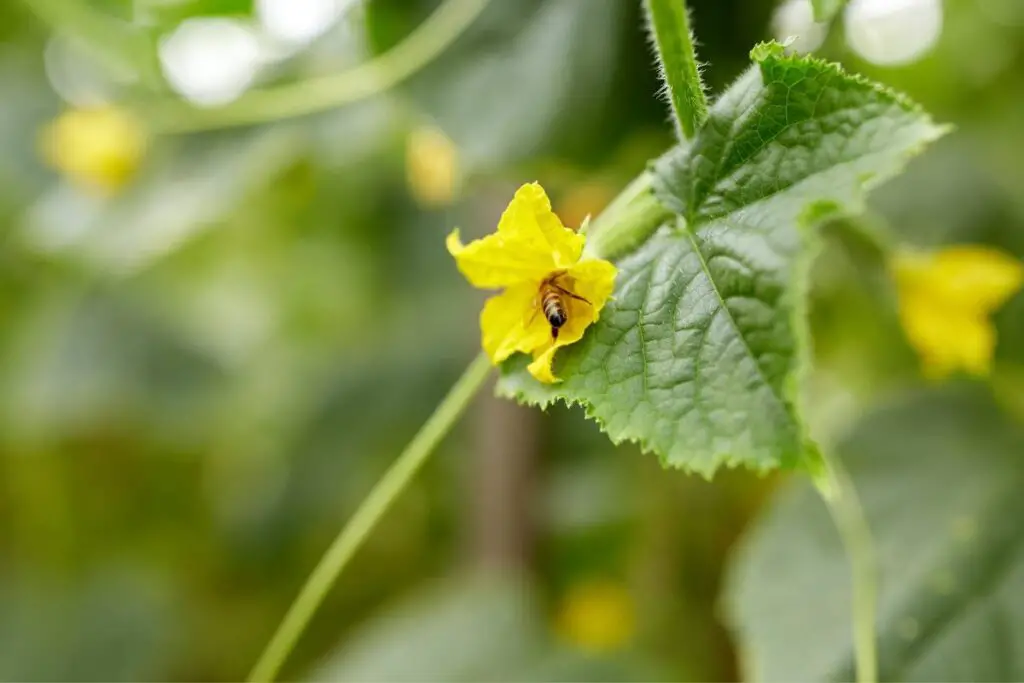
Most home gardeners prefer self-pollination over cross-pollination.
At the same time, they also want to grow different Zucchini varieties.
If you want to do the same thing, here are some ways to prevent cross-pollination:
Looking for gardening supplies? We have tested 100's of products before recommending them to you guys. Check out our best pick below:
| Image | Gardening Supplies | Best Price? |
|---|---|---|
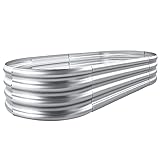 Top
Top Top
Top | Raised Garden Bed Kit | Check On Amazon |
 | XLUX Soil Moisture Meter, Plant Water Monitor, Soil Hygrometer Sensor for Gardening, Farming, Indoor and Outdoor Plants, No Batteries Required | No Results |
 Top
Top Top
Top | 82 Pcs Garden Tools Set and Extra Succulent Tools Set | Check On Amazon |
 | Joeys Garden Expandable Garden Hose with 8 Function Hose Nozzle, Lightweight Anti-Kink Flexible Garden Hoses, Extra Strength Fabric with Double Latex Core, (50 FT, Black) | No Results |
 Top
Top Top
Top | Dual Chamber Compost Tumbler | Check On Amazon |
 Top
Top Top
Top | Sunnyglade Plant Stakes | Check On Amazon |
 Top
Top Top
Top | Organic Cold Pressed Neem Seed Oil | Check On Amazon |
 Top
Top Top
Top | Mighty Mint Gallon :-Insect and Pest Control Peppermint Oil | Check On Amazon |
 Top
Top Top
Top | Scotts DiseaseEx Lawn Fungicide | Check On Amazon |
 Top
Top Top
Top | Jacks Classic 20-20-20 All Purpose Fertilizer | Check On Amazon |
 Top
Top Top
Top | 30,000 Seeds Pollinator Attracting Wildflower Mixture | Check On Amazon |
 Top
Top Top
Top | Survival Vegetable Seeds Garden Kit-Over 16,000 Seeds | Check On Amazon |
Isolating Zucchini Plants by Distance
Isolating one Zucchini variety from other varieties with whom they can cross-pollinate is the primary thing to consider while preventing cross-pollination.
You have to maintain at least a 1-mile distance between the different Zucchini varieties.
You can separate them by several weeks so they have different flowering times.
The smaller varieties won’t produce enough pollen to affect the pollination.
The amount of pollen bees will carry from these varieties to the larger varieties won’t be enough for pollination.
On the contrary, the larger varieties produce enough pollen to pollinate. If the bees carry them to the smaller varieties, there will be a cross-pollination.
Isolate small-fruited varieties like Spaghetti should be isolated from the large-fruited plants.
It is difficult for most home gardeners to maintain a ½ to 1-mile distance between the Zucchini varieties to isolate them.
Home gardeners like us will only have a little space. Try other methods of preventing cross-pollination.
You can isolate the varieties by time.
Isolation by Flowering Time
You can make a gap between each variety’s flowering period to reduce the chances of cross-pollination.
Observe the growth of the first flowers in your Zucchini plants.
Plant the varieties with different flowering times.
Or, consider succession planting.
It will allow one variety to flower when the other variety has ended its flowering period.
You can grow Zucchini varieties containing longer flowering periods, with the Zucchinis having shorter flowering durations.
But this will have both an advantage and a disadvantage.
Suppose both flowers simultaneously or slightly before or after.
In that case, cross-pollination might occur unless the latter variety (shorter flowering period) stops flowering.
You can prevent cross-pollination with the preventive measures I have shared.
After the flowering period of the latter variety is over, there won’t be any risk of cross-pollination.
This method can be challenging, especially for regions with a shorter growing season.
But it can be a good option for someone who wants to stop cross-pollination.
Physical Barriers to discourage pollinator activities
Using physical barriers is another way to prevent cross-pollination among the Zucchini varieties.
Use a net or cage around the plants to provide physical barriers.
Nets or cages will stop the pollinators from visiting your garden and prevent pollination.
You can cover the female flowers with a paper muslin bag to hand-pollinate them.
It will prevent the insects from carrying the pollen to the female flowers, stopping cross-pollination.
Consider Hand-pollination
If you do not allow the pollinators to pollinate, you must hand-pollinate them.
Collect the pollen from the male flower using a cotton swab or paintbrush.
Now, brush the cotton or the brush to the stigma of the female flowers, and then cover it with a muslin bag to prevent further pollination.
Once you witness the fruit growth at the base, you can open the cover and let the fruit grow.
Zucchini varieties and Isolation
Zucchinis have several varieties, and you need to keep each of them away from each other if you want to prevent cross-pollination.
Remember, Zucchinis are squashes, but all squashes are not Zucchinis.
Zucchini is a summer squash, and it has several other varieties.
All the Zucchini varieties will cross-pollinate with each other.
Besides that, since Zucchini is a summer squash, it will cross-breed with all other summer squashes, especially the yellow summer squashes and some winter squashes.
In this section, I will share the squashes with whom Zucchinis are likely to cross-pollinate and the Zucchini varieties:
Summer squashes
Since Zucchini is a summer squash, it will cross-pollinate with other summer squash varieties that share the name Cucurbita Pepo.
Zucchinis will also cross-pollinate with Cucurbita Moschata and Cucurbita Mixta.
The summer squashes with whom Zucchinis can cross-breed are:
- Crookneck
- Pattypan
- Straightneck
- Zephyr
Winter squashes
Besides the summer squashes, Zucchinis will also cross-pollinate with some winter squashes.
Winter squashes are the annual fruits representing several squash species.
These are also from the genus Cucurbita.
The difference between the winter and summer squashes is that the winter squashes are harvested when the skin has matured and turned into a hard rind, and the seeds are mature.
Some winter squashes that cross-pollinate with Zucchinis are:
- Acorn
- Butternut
- Spaghetti
Gourds and bottle gourds
Besides these squashes, some other Cucurbitaceae members might cross-pollinate with the Zucchinis because they are not only from the same family but also the same genus, Cucurbita.
That’s why they can cross-pollinate. However, all members from the Cucurbitaceae (but not from the same genus) won’t cross-pollinate with Zucchini.
Here are some gourd varieties that can cross-breed with Zucchinis:
- Lagenaria
- Luffa
- Crown of Thorns
- Pumpkin
- Turban Gourd
- Cucuzza or Cucuzzi
All Zucchini varieties
Most Zucchini varieties are members of Cucurbita Pepo and will readily cross-pollinate with each other:
- Black beauty
- Green Machine
- Lebanese
- Dunja
- Easy pick gold II
- Spineless Perfection
- Eight balls
- Round Zucchinis
- Ronde de Nice
- Cocozelle
- Success PM
- Sunglo
All these Zucchini varieties will cross-pollinate with each other because they all belong to Cucurbita Pepo.
You must keep these varieties away from the Zucchinis to prevent cross-pollination.
While it is okay, many people do not like this as they want to maintain the genetic purity of the Zucchini varieties.
Besides, the hybrid Zucchinis are extremely bitter to taste and are toxic for consumption.
Plants that do not cross-pollinate with Zucchini are:
- Cucumbers
- Melons
- Cantaloupe
- Eggplant
Identifying Cross-Pollination

When Zucchinis cross-pollinate, identification is easy.
You will have a hybrid variety that looks unlike any of its parent plants.
Instead, it will have a look combined of both the parent plants.
For example, when a dark-colored Zucchini variety cross-pollinates with yellow-colored Zucchini, you will receive a Zucchini of both colors, yellow and green.
Also, the shape will be slightly different.
If you look closely, you will see that the hybrid has the shape of both the parent varieties.
For example, if a Lebanese Zucchini cross-pollinates with a Pattypan Zucchini, the hybrid will have a peculiar shape.
When you find an oddball with combined colors and a bizarre shape that does not match any other varieties you are growing, you have a cross-pollinated hybrid variety.
Removing this odd one from the garden would be wise if you do not want further unwanted cross-breeding.
Best Practices for Plant Placement
Best practices for plant placement depend on whether you want them to self-pollinate or cross-pollinate.
Here are best practices for Zucchini plant placement in terms of both self and cross-pollination:
- If you want the Zucchinis to self-pollinate to maintain genetic purity and collect the seeds of specific varieties, plant the same varieties together.
- If you have different varieties, you must either maintain a distance of 1 mile between each other or build physical barriers to prevent cross-pollination.
- If you are concerned about cross-pollination but do not have enough space to isolate the different Zucchini varieties to prevent cross-breeding, place some physical barriers near the plants to prevent pollination by external agents.
- On the contrary, if you want them to cross-pollinate and receive exciting and hybrid varieties, you can plant them in one place without any barriers or distances.
- Maintain 2-3 feet of distance between each plant in both cases.
- Plant the plants in well-drained soil and ensure that your selected place provides enough sunlight to your plants.
Companion Planting
Companion planting also depends on whether you are supporting self-pollination or cross-pollination.
Try growing Zucchinis from the same varieties together to support self-pollination and discourage cross-pollination.
Except that, you can plant plants with whom there are no chances of cross-pollination and can attract pollinators:
Sunflowers and nasturtiums
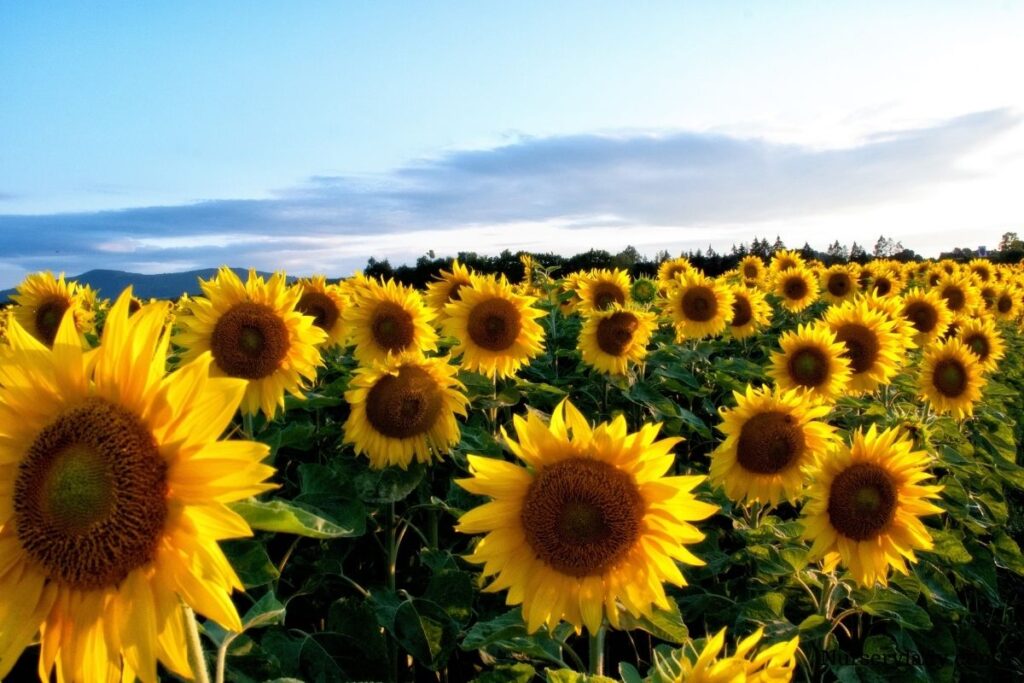
Sunflowers are excellent choices for attracting pollinators.
The pollinators will keep visiting your garden because sunflowers are giant and have enough nectar.
Along with that, they will also visit the Zucchini flowers and help them to pollinate and grow fruits.
Sunflowers also attract birds that eat the sunflower seeds.
At the same time, these birds will also feed on the Zucchini pests and keep your plant bug-free.
Nasturtiums also have enough nectar on the flowers, and bees will keep visiting them.
It will also benefit the Zucchinis as they will visit the Zucchini flowers, too, and encourage pollination.
Cucumbers
Cucumbers and Zucchinis are from the same family but not from the same genus species.
Therefore, there is no chance of cross-pollination.
You can grow them close without any issues.
Cucumbers can also attract squash bees, which helps in pollination.
These bees will help both the plants for adequate pollination and higher yields.
Corn
Corns keep weeds at bay.
When planted as a companion of the Zucchinis, there won’t be any competition for nutrients, and the plants will thrive.
Peas
These are excellent companions for the Zucchinis.
Peas are from legume groups that release lots of nitrogen into the soil.
When planted with the Zucchinis, it will help in their vegetative development.
At a time, Zucchinis will need nitrogen for their vegetative growth.
If you do not provide enough nitrogen fertilizer or forget to apply some, the Peas plant can help cover up this deficiency.
Dill
Dill is an herb plant. It helps deter pests like cabbage worms prone to laying eggs on the Zucchini leaves.
Beneficial pollinators will also get attracted to your garden and help the Zucchinis pollinate.
Cucurbita members
If you want to encourage cross-pollination, you can grow the other fruits or vegetables that belong to the Cucurbita family.
Grow Zucchinis with other summer squashes, like Crookneck and Pattypan, with some winter squashes, like Acorn or Butternut.
You can also grow the Zucchini varieties together, for example, Black Beauty, Spineless Perfection, Eight Balls, Round Zucchinis, Sunglo, etc.
Whether they self-pollinate or cross-pollinate depends on the pollinators and other external agents.
You will receive varieties of Zucchinis in your garden with different colors, shapes, and sizes.
You will also receive some interesting hybrid varieties if they cross-pollinate.
You can still grow the same varieties together without giving them any chances of cross-pollination by taking preventive measures like hand-pollinating and putting up physical barriers.
Saving Seeds and Maintaining Purity
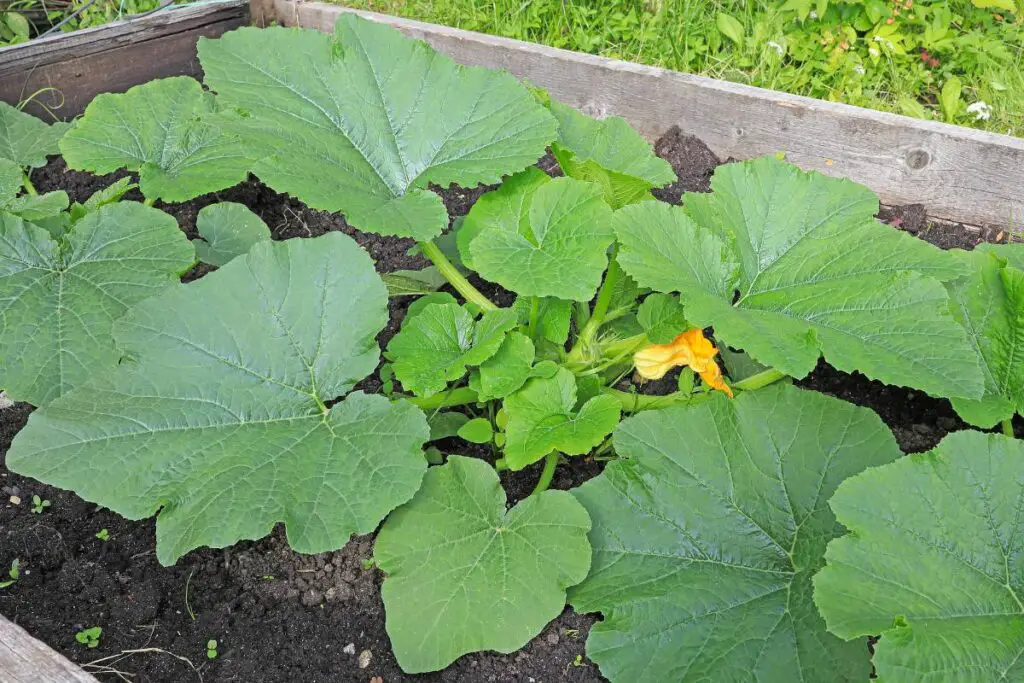
With self-pollination, you will receive the exact type of Zucchini you have grown.
But with cross-breeding, you will receive a completely different variety that does not match any variety you have.
To save the seeds of the specific Zucchini varieties and maintain genetic purity, you must rely on self-pollination and completely prevent cross-breeding.
Group and grow the same varieties together, maintain distance, and use barriers to prevent cross-pollination.
This way, you will receive the true Zucchini seeds, save, and enjoy.
You can also plant different varieties, grow a hybrid, and receive the seeds for the following year’s planting.
But the problem is that it will be a completely different variety with unknown features.
They will be a completely new one with the combination of the genes of both parents.
Besides, they won’t be edible.
So, there is no point in doing it.
That is why most gardeners prefer true varieties and grow the same varieties together to receive the specific ones and maintain the genetic purity.
Saving seeds
Once you have the seeds, you need to save the seeds for the next planting season.
When we pick Zucchini to eat, we pick it before they become fully mature.
They have started ripening, and we pick them up to enjoy their sweet flavor.
These Zucchinis won’t have any seeds.
To receive the seeds, you need to let them mature entirely and then pick them up. Or, you can ripen them off the vine.
A fully ripe or mature Zucchini will give you many seeds to save for next year. One mature Zucchini will be enough to save seeds for the plant season’s planting.
One fruit can give you around 250-500 seeds.
I always enjoy the young Zucchinis. But once, one Zucchini was hidden behind the leaves and became overripe.
I received around 100-150 viable seeds when I cut it open. It was more than enough for the next season.
To save the seeds:
- Ferment them in a container filled with water for 1-2 days. After two days, clean them with a dry cloth and let the seeds dry.
- Another method is to rinse the seeds, give them a good swirl, let them sit in the water for 10 minutes, and then strain them.
- Spread the seeds on a tray and let them dry.
- After drying the seeds (in both methods), you need to select the seeds. The flat and plump seeds are worth saving, and the flat and deformed seeds will be taken to the compost.
- Let the seeds dry for around 2-4 days. When they are ready for storage, check the seed’s flesh. It should be slightly papery. If you are unsure, open and see the true seed. It should appear and feel dry.
Collect the seeds in a paper envelope or a container and store them in the basement or kitchen closet and cabinet.
Ensure it is kept in a cool and dry place, not with extra moisture, as that can promote germination or rotting.
Final thoughts
Zucchinis can cross-pollinate with all the Zucchini varieties, the summer and winter squashes, and other Cucurbitaceae that belong to the same Cucurbita genus as Zucchini, like the gourds and bottle gourds.
Many gardeners, especially home gardeners, discourage cross-pollination, as they want to maintain genetic purity and only want seeds of specific varieties. But some gardeners like experimenting and encourage cross-pollination. To avoid cross-pollination, plant the same Zucchini varieties, encourage hand-pollination, and put up barriers to stop the pollinators from reaching the Zucchini.
For companion planting, grow plants that do not belong to Cucurbitaceae or Cucurbita Pepo. Also, grow plants encouraging pollinators, like sunflowers, nasturtiums, corn, peas, and dill.
Are cross-pollinated squash edible?
Cross-pollinated squashes are primarily inedible. These hybrids will have a lot of cucurbitacin. Consuming these will be extremely bitter to taste.
Will cross-pollinated squash be toxic?
The cross-pollinated Zucchinis will be toxic. The normal squashes will have a suitable amount of cucurbitacin. But when a hybrid is grown, it will have the cucurbitacin from both parents and have a large amount of cucurbitacin. Thus, it is considered toxic.
Reference: Zucchini Wikipedia

